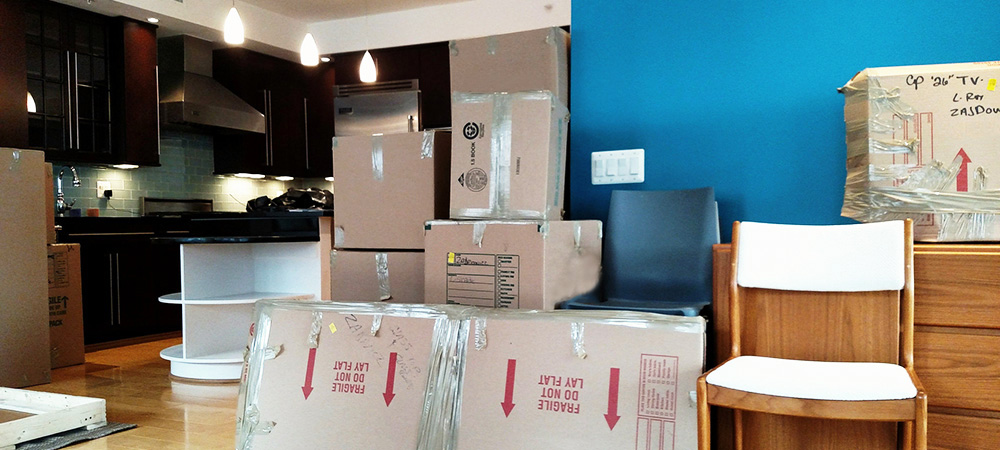
So, you’ve signed a tenancy agreement or finally made the leap onto HK’s lucrative property ladder. Moving dates are sorted and you are looking forward to creating new memories in your new house. But first… the daunting task of moving home must be attended to.
Moving is often said to be the third most stressful event in one’s life, behind the death of a loved one and divorce. When you live in Hong Kong, it’s also an event that you will likely encounter every 2 years, or before that should you or your landlord elect to invoke the standard break clause. With limited protection on the tenant side after the abolishment of rent control measures in 1998, landlords are free to raise rents as they please, with the powers of supply and demand attempting to keep rentals in check. While most landlords will take into account a mix of fair value and their experience with you as their tenant, there are occasional stories where greed does triumph.
But, I digress…there are many positives for moving more frequently within HK and of course this might come down to more than just price. This includes a change of scenery, the ability to experience different districts and a larger potential space. Focus on the positive and read on for 8 ways to reduce stress ahead of the big move.
1. Organize Your Belongings: Keep, Sell, Donate, Dispose
 Going through your possessions a few weeks in advance of a move gives you time to coordinate any donations and ensure that you do not end up throwing everything away in a last minute panic. You’ll be able to reminisce over the memories associated with certain items and share these moments with family members to ensure you go into a move as a “team”.
Going through your possessions a few weeks in advance of a move gives you time to coordinate any donations and ensure that you do not end up throwing everything away in a last minute panic. You’ll be able to reminisce over the memories associated with certain items and share these moments with family members to ensure you go into a move as a “team”.
Where possible, designate areas in the house to place objects you want to sell, donate or dispose of. This will allow other family members to do a quick review and create a central space where you can take photos to include alongside any online advertisements. Just remember to keep an eye out for any hoarders in your midst!
Some popular sites for selling second hand items are:
Some charities that accept donations (if you able to deliver) are:
- Crossroads Foundation (accepts wearable clothing, electronics, furniture and household goods)
- Salvation Army (accepts wearable clothing and electronics)
- Oxfam (accepts wearable clothing, small home appliances and books)
TIP: If you have an eager child looking for some extra cash, this is also a great opportunity to teach him or her the art of pricing and negotiation while handing off some responsibility!
2. Prepare Checklists
 You’re making a list, you’re checking it twice, it’s got to be right or things won’t be nice! Checklists are super helpful in ensuring that all tasks are attended to prior to, during and after a move.
You’re making a list, you’re checking it twice, it’s got to be right or things won’t be nice! Checklists are super helpful in ensuring that all tasks are attended to prior to, during and after a move.
Set deadlines and priorities for items from packing and setting up utilities to transferring phone and internet lines. Include some buffer time for any tasks where delays may be likely. Prepare a template which you can use for future moves and mark off completed items to indicate your level of progress. It’s always good to know you’re moving in the right direction!
Sortly, Todoist, Trello and Wunderlist are some great list creation apps with user friendly interfaces that you can use on your mobile devices, though good old Excel will often do the trick, especially when combined with Google Docs to allow dynamic updating by groups.
3. Call in the Professionals: Get a Quote from a Moving Company
Expensive but worth it? A moving company can be a great aid, especially when packing up a larger home. Companies such as Crown, Asian Tigers, Allied Pickfords, Links, Santa Fe and Trade Winds Transport will provide you with an estimate based on an initial set of information followed by a home visit for further scoping.
Boxes and packing material will be provided and staff will arrive prior to your moving day to masterfully assist with packing. Like good natured locusts, it’s quite incredible how fast they can pack up each room! Insurance can also be covered should any items break or go missing during the journey to your new home.
For individuals with smaller homes, one can look into using smaller local vendors or simply calling in some favours from friends while hiring a van through Gogo Van, Lala Move (formerly Easy Van) or Man with a Van. Just make sure to plan in advance to avoid unnecessary stress on the day itself.
TIP: If you’re getting friends to help, remember to pick them wisely cause…

4. Get the Kids Ready, Avoid the Tears & Tantrums
 Moving can be traumatic for children no matter what their age. Involving them in the process and having open discussions will help them adjust more quickly and get them excited. Sit them down and talk about layout plans for their new rooms (here’s some inspiration!), conduct a site visit of the new house and neighbourhood, and do a quick online search for books about moving that they’ll be able to relate to. Some ideas to get you started can be found here.
Moving can be traumatic for children no matter what their age. Involving them in the process and having open discussions will help them adjust more quickly and get them excited. Sit them down and talk about layout plans for their new rooms (here’s some inspiration!), conduct a site visit of the new house and neighbourhood, and do a quick online search for books about moving that they’ll be able to relate to. Some ideas to get you started can be found here.
On the day of the move, ask a trusted friend if they would mind looking after any young children so that you and your helpers can maintain your focus. Let your children’s teachers know that you’re moving so they can take this into account when following up on homework assignments and in case your children display any noticeable side effects that may be a result of the move. If you’re moving your kids to a new school, try and be there on their first day to help alleviate some of the associated stress.
Prioritize getting your children’s rooms sorted in your new home and try and maintain their regular schedules to keep as much unchanged as possible.
5. Pack with a Plan
 Strategize your packing by room and make sure you label boxes accordingly on both the top and sides. It’s a good idea to track what you put into each box so you can find things more easily when you’re in your new home – you can even use apps like Sortly to create custom QR labels to help with this.
Strategize your packing by room and make sure you label boxes accordingly on both the top and sides. It’s a good idea to track what you put into each box so you can find things more easily when you’re in your new home – you can even use apps like Sortly to create custom QR labels to help with this.
Put heavy items in smaller boxes and, as a general rule, put heaviest items in first. Fill gaps in all boxes to avoid objects moving around and breaking, and wrap up delicate items in bubble wrap or soft linens.
Keep necessities and valuables in a safe place and carry these with you to minimize the chances of your most treasured belongings and important documents going missing, while also making sure you have some initial basic supplies. Another suggestion is to pack a suitcase as if you were going on a two week holiday. While it shouldn’t take long to get up and running in a city like Hong Kong, this provides a safety net should other responsibilities get in the way.
6. Eat Healthy, Rest Up
 Often neglected, it’s important to keep your body and mind fresh! A junk food diet and lack of sleep can lead to the smallest unexpected event triggering a full on meltdown.
Often neglected, it’s important to keep your body and mind fresh! A junk food diet and lack of sleep can lead to the smallest unexpected event triggering a full on meltdown.
With food delivery services such as Food Panda and Deliveroo, there really is no excuse for eating unhealthily. You can also keep your fridge plugged in and stocked with all your essentials until the day before your departure (when you’ll need to allow your freezer to defrost).
From a sleep perspective, try to get to bed at a decent hour and not worry too much if you’re lagging behind a little in your move schedule. We know this isn’t easy, with Hong Kongers already struggling to get the recommended 7-8 hours per night, but it’ll be well worth your while especially noting that the majority of us have trouble sleeping in unfamiliar surroundings after moving to a new home. Attempt to relax and reach a stage of mindfulness as you drift off and dream about the adventures to come.
7. Make Use of the Web for Moving Services
Worried about losing mail during your move? Fear not! Hong Kong Post provides a Mail Redirection Service at a small cost of $136 for the first 3 months and $172 for each succeeding 6 months. Click here for details. This will save you from sending out mass “change of address” emails until after you’ve settled in, allowing you to avoid any related questioning and house warming requests until you are ready to comply.
By law, you are required to notify the Transport Department within 72 hours of a change of address should you be a holder of a Hong Kong Driving License. Do this in a few clicks and simultaneously notify any other applicable government departments at this link.
If your property agent hasn’t already provided you with advice on the utilities front, click here for some useful links you can easily navigate to for closing and opening your water, electricity and gas accounts.
Perhaps most important for most Hong Kongers (who don’t already have an “unlimited data” plan), you’ll want to get your Internet and TV services transferred to your new address as quickly as possible so you can efficiently revive your digital life and avoid complaints from your kids when they run out of data while playing Pokemon Go (unless that’s part of your plan ;)). Simply call your provider’s customer service hotline or fill out a service relocation form on their website.
Standard Internet Providers:
- PCCW
- Netvigator Broadband
- Hong Kong Broadband (visit one of their shops or call your Customer Engagement Officer. Submit application at least 30 days before service relocation)
8. Don’t Forget to Say Goodbye!
 With the end in sight, you’ll need to arrange a date to hand back the keys to the landlord or agent of your old apartment. You’ll also need to restore any items you’ve changed back to their original condition (subject to your tenancy agreement and fair wear and tear). Seal any nail holes with wall putty (available at your local hardware store) and clean up any remnants of your inhabitancy through a waste/clean-up service. Your building’s caretaker may also be able to offer advice on this if required.
With the end in sight, you’ll need to arrange a date to hand back the keys to the landlord or agent of your old apartment. You’ll also need to restore any items you’ve changed back to their original condition (subject to your tenancy agreement and fair wear and tear). Seal any nail holes with wall putty (available at your local hardware store) and clean up any remnants of your inhabitancy through a waste/clean-up service. Your building’s caretaker may also be able to offer advice on this if required.
Lastly, take some photos to document the condition of the flat and close the door one final time as you recall all the memories you created within these walls.
Happy Moving and let us know if you have any tips you’d like to add!





